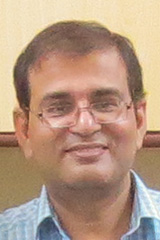Related Research Articles

The Indian Institute of Technology Bombay is a public research university and technical institute in Mumbai, Maharashtra, India.
The National Institute of Design (NID) are a group of autonomous public design institute in India, with the first institute founded in 1961 in Ahmedabad. The other NIDs are located in the cities of Kurukshetra, Amaravati, Jorhat and Bhopal. The NIDs function autonomously under the Department for Promotion of Industry and Internal Trade (DPIIT), Ministry of Commerce and Industry, Government of India. The NIDs are recognised by the Department of Scientific and Industrial Research of the government's Ministry of Science and Technology as a scientific and industrial research organisation. The universities are accorded Institutes of National Importance under the National Institute of Design Act, 2014.

Techfest is the annual science and technology festival of the Indian Institute of Technology Bombay, consisting of social initiatives and outreach programs throughout the year.

The IIT Bombay Industrial Design Centre School of Design is a design school part of the Indian Institute of Technology Bombay, a public research university in Powai, Mumbai. It offers four-year Bachelor of Design (B.Des.) and two-year Master of Design (M.Des.) programmes, a five-year integrated Bachelor's plus Master's in design programme, and doctoral programmes (PhD) in design across various disciplines such as industrial design, communication design, animation and automobile design.

Senapathy “Kris” Gopalakrishnan is an Indian businessman and the chairman of Axilor Ventures, a startup accelerator. He is one of the co-founders of Infosys, having served as its CEO and managing director from 2007 to 2011 and vice chairman from 2011 to 2014.
Ravi Kant is an Indian executive who had served as the vice chairman from 2 June 2009 to 31 May 2014 and the managing director of Tata Motors from 29 July 2005 to 1 June 2009. He is known to lead Tata Motors in its tough times.

Indian Institute of Technology Indore is an Institute of national importance located in Indore, Madhya Pradesh, India. IIT Indore was founded in the year 2009. It was one of the eight new Indian Institutes of Technology (IITs) started by the government of India in the year 2009. IIT Indore is officially recognized as an Institute of National Importance by the Government of India.

Indian Institute of Technology Bhubaneswar is a public technical university established by the government of India in 2008, located at Kansapada village, Khordha district, Odisha, India. It is located 24 kms south of Bhubaneswar and 4 kms from Jatni but is named after Bhubaneswar.

The Indian Institutes of Technology (IITs) are a network of engineering and technology institutions in India. Established in 1950, they are under the purview of the Ministry of Education of the Indian Government and are governed by the Institutes of Technology Act, 1961. The Act refers to them as Institutes of National Importance and lays down their powers, duties, and framework for governance as the country's premier institutions in the field of technology. 23 IITs currently fall under the tenor of this act. Each IIT operates autonomously and is linked to others through a common council called the IIT Council, which oversees their administration. The Minister of Education of India is the ex officio chairperson of the IIT Council. According to data obtained through Right to Information (RTI) applications, approximately 38% of Indian Institute of Technology (IIT) graduates from the class of 2024 have not secured job placements. This is the highest percentage in the past three years, with a steady increase from 19% in 2021 and 21% in 2022.

The Singapore University of Technology and Design (SUTD) is a public autonomous university in Singapore.

OrthoCAD Network Research Cell is a federally funded research and development facility in the Indian Institute of Technology Bombay, Mumbai, India. The Laboratory's primary function is the design and development of reconstruction systems for orthopaedic and other applications, the current focus is on mega-implants for limb-saving surgery, mainly for children affected by bone cancer. The Cell later led to the establishment of Biomedical Engineering and Technology (incubation) Centre (BETiC).

The Common Entrance Examination for Design (CEED) is a joint entrance exam for post-graduate studies in the field of technological design. The exams are held annually at all Indian Institutes of Technology (IITs) and Indian Institute of Science (IISc). The examination is hosted by the Industrial Design Centre, Indian Institute of Technology Bombay on behalf of Ministry of Human Resource Development, Government of India.

Udaya Kumar Dharmalingam is an Indian academic and designer noted for his design of the Indian rupee sign. His design was selected from among five short listed symbols. According to Kumar, the design is based on the Indian tricolour.

Deepak B. Phatak is an Indian computer scientist and academic, and a recipient of the Padma Shri Award for his contribution in science and technology in 2013. He is known for his notable work for upgrading Aakash, advertised by its manufacturer as the 'world's cheapest tablet'. In 2009, he was ranked one of the 50 most powerful people in India.
Shilpa Ranade is an Indian designer, animator, illustrator, filmmaker and academic. She has been faculty at the Industrial Design Centre at IIT Bombay since 2001. She has directed animated short films for Channel 4, UK and her films have been screened all over the world, winning accolades in some of the most prestigious film festivals. The award-winning animation movie Goopi Gawaiya Bagha Bajaiya was her last full-length feature film which world premiered at the Toronto International Film Festival. Her other films are Naja Goes to School and Mani's Dying.

Subhasis Chaudhuri is an Indian electrical engineer, former director at the Indian Institute of Technology, Bombay and currently Chairman of the Board of Directors of BSE Limited. He is a former K. N. Bajaj Chair Professor of the Department of Electrical Engineering of IIT Bombay. He is known for his pioneering studies on computer vision and is an elected fellow of all the three major Indian science academies viz. the National Academy of Sciences, India, Indian Academy of Sciences, and Indian National Science Academy. He is also a fellow of Institute of Electrical and Electronics Engineers, and the Indian National Academy of Engineering. The Council of Scientific and Industrial Research, the apex agency of the Government of India for scientific research, awarded him the Shanti Swarup Bhatnagar Prize for Science and Technology, one of the highest Indian science awards, in 2004 for his contributions to Engineering Sciences.
Avinash Kumar Agarwal is director of Indian Institute of Technology, Jodhpur. He is an Indian mechanical engineer, tribologist and a professor at the Department of Mechanical Engineering of the Indian Institute of Technology, Kanpur. He is known for his studies on internal combustion engines, Emissions, alternate fuels and CNG engines and is an elected fellow of the American Society of Mechanical Engineering (2013), Society of Automotive Engineers, US (2012), National Academy of Science, Allahabad (2018), Royal Society of Chemistry, UK (2018), International Society for Energy, Environment and Sustainability (2016), and Indian National Academy of Engineering (2015). The Council of Scientific and Industrial Research, the apex agency of the Government of India for scientific research, awarded him the Shanti Swarup Bhatnagar Prize for Science and Technology, one of the highest Indian science awards for his contributions to Engineering Sciences in 2016. Agarwal has been bestowed upon Prestigious J C Bose Fellowship of Science and Engineering Research Board. Government of India. Agarwal is among the top ten highly cited researchers (HCR) of 2018 from India, as per Clarivate Analytics, an arm of Web of Science.

BETIC based at Indian Institute of Technology Bombay is an inter-disciplinary multi-institution initiative for medical device innovation. Established in 2014 with support from the government of Maharashtra, it comprises a network of 14 engineering and medical institutes across the state. The BETIC team have developed 50 medical devices as of 2019, and licensed 20 of them to startup companies or industry for mass production.

Nina Sabnani is an Indian animation filmmaker, illustrator and an educator. She is known for her films which blend together animation and ethnography. Collaboration with diverse ethnic communities as well as storytelling with words and imagery have been her research interests.

Rohit Srivastava is a Himanshu Patel Chair Professor in the Department of Biosciences and Bioegineering at IIT Bombay specialising in medical diagnostic devices, nanoengineered materials and photothermal cancer therapy. He was awarded the Shanti Swarup Bhatnagar Prize for Science and Technology in Medical Sciences in the year 2021 for his contributions to the development of affordable medical devices.
References
- ↑ "Faculty". IDC School of Design. 6 June 2017.
- ↑ Chhapia, Hemali (17 April 2009). "It's possible to trace back every vote in EVM". Times of India. Retrieved 20 April 2021.
- 1 2 3 Tegta, Malvika. "Talkin' about a revolution". DNA. Retrieved 20 April 2021.
- 1 2 Chakrabarti, Amaresh; Poovaiah, Ravi; Bokil, Prasad; Kant, Vivek, eds. (6 February 2021). Design for Tomorrow-Volume 2: Proceedings of ICoRD 2021 (First ed.). Singapore: Springer. p. 1004. ISBN 9789811601187 . Retrieved 20 April 2021.
- ↑ "Ravi Poovaiah". UX India 2017. Retrieved 20 April 2021.
- ↑ Shete, Yugandhara (8 May 2018). "The story of Indian animation: not just a blend of stories, but an unsung history". Animation Express. Retrieved 20 April 2021.
- ↑ Dhar, Aarti. "Posting a new look". The Hindu. Retrieved 20 April 2021.
- ↑ "Invent: a programming language for children". pranavmistry.com/. Retrieved 20 April 2021.
- ↑ Design for Tomorrow―Volume 1: Proceedings of ICoRD 2021: 221 (Smart Innovation, Systems and Technologies). Singapore: Springer. 20 May 2021. p. 983. ISBN 978-9811600401.
- ↑ Design for Tomorrow―Volume 3: Proceedings of ICoRD 2021: 223 (Smart Innovation, Systems and Technologies) (First ed.). Springer. 26 April 2021. p. 837. ISBN 978-9811600838.